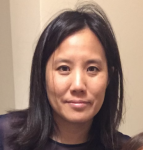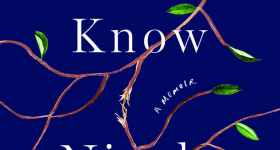Ed Lin’s writing about Taiwan has created a new genre of thriller, gratifying readers eager to know more about Taiwanese contemporary life. With his psychedelic descriptions of Taipei night markets, alternative rock scenes gambling spots, as well as occasional country drives though the island, Lin traces panoramic routes for his protagonists and the crimes they follow. His writing is sparse but rhythmic, reflecting his other talent of playing the bass guitar.
His latest book, Incensed, is the second novel in his Taipei Night Market series that features Jing-nan as its protagonist, a man in his twenties who finds himself embroiled in crime scenes when not working as a Taipei night market vendor. Jing-nan has returned from college in the United States to take over the family business after his parents’ tragic deaths. While searching for the whereabouts of his estranged friends and family, he encounters a dark underworld that he must navigate to resolve his unanswered questions, risking his own life in the process.
I met Lin at the Asian Art Museum in San Francisco. Despite a grueling book tour schedule, he was relaxed and enthusiastic -- his easygoing optimism and gracious humility countering the usual stereotypes of folks from his native New York.
Evelyn Ch’ien: Taiwan is the setting for Ghost Month and your Taipei Night Market series. Could you talk about your exposure to Taiwan?
Ed Lin: My formal understanding of Taiwan came through my parents and then extensive research. Martial law had been imposed, so you couldn’t really talk about Taiwan [politics] until the late ‘80s. The Kuomintang (KMT) had their spies all over the United States, in restaurants and on college campuses. If you were talking about Taiwanese independence or overthrowing the KMT, your relatives back in Taiwan would suffer. They would suddenly disappear or have their passports confiscated, things like that. My father didn’t really talk about Taiwan until martial law was lifted. And then he was like, “Taiwan must be free!”
In that sense, Taiwanese American identity is still developing. Just the fact that you're allowed to have it now is pretty remarkable. I was interviewed by a woman at [the Chinese-language newspaper] China Daily about Ghost Month and I found that really interesting because [China Daily is] basically a Chinese government publication. I asked, “Is it okay to talk about Taiwan?” And she said, “It’s okay to talk about Taiwan.” I couldn’t use the word “Taiwanese,” though. [Laughs.]
One thing that helped me a lot [in my research] was Columbia University Press' "Modern Chinese Literature from Taiwan" series that translated a lot of contemporary and fairly recent Taiwanese works into English. I think I’ve read every single book in the series to date.
I visited Taiwan a few times when I was a kid, but the hardcore research started in 2012. I know someone who works in the music and entertainment industry in Taiwan where there’s often an element of organized crime -- because, how else to scrape the money to record a song? Through that contact, I have been able to talk to people involved in organized crime. I also met this guy online who had been an anti-KMT activist in the ‘70s who was part of a group that filmed themselves spray-painting government buildings and holding protests. There was a whole network that distributed those films to stir up Taiwanese nativist feelings.
So this guy, who apparently was the driver on a number of fire-bombings of government buildings (no one was killed, but they just would burn out the buildings or something) -- this guy who was the former wheelman dragged me to this bar where I met this other guy who’s a journalist and broadcaster. I asked him if he knew anything about organized criminal groups, and he said, "Oh, actually my station is owned by a gangster. He is really nice. He takes us out to dinner when we work late.”
In Taiwan, people bend over backwards to help you. It’s part of island culture. Everybody is just trying so hard to help each other because whatever calamity your neighbor faces, you’re probably going to be facing in the next season.
I once got lost on my way to finding this temple in Taichung. I ended upon getting pushed into a random bus by a strange woman who claimed to be going in my same direction. She yells "Ta shi wairen" [He's a foreigner] as the bus doors closed and separated us, and so I found myself on a bus going to an unknown destination without any change on me at all. The bus starts going, and I was like, “I don’t have any money.” But then this woman seated in the front nudges her teenage daughter seated beside her, and the daughter silently hands me the money for the fare. I was like, "I cannot believe this. This is unbelievable. This is nuts." You know? This incident, I would have a hard time thinking of it as fiction, because fiction has to be believable.
Ch’ien: Jing-nan, the protagonist in the Taipei Night Market series, is based on you?
Lin: In some ways. [But unlike Jing-nan], Joy Division is not my favorite band.
Photo of the author by Gregory Costanzo
Ch’ien: What are your favorite bands?
Lin: I love Hüsker Dü. I grew up with that stuff. Zen Arcade [1984 Hüsker Dü album] was my life. I like Bad Brains of course. I love Swervedriver. Actually, Swervedriver might be number one.
Ch’ien: Do you play an instrument?
Lin: I play bass. I was in a couple of different bands. It’s always the bass players who write. Like Dee Dee Ramone. The bass is like a subliminal instrument, really. If you can hear it, it was probably not being applied in the right way. Writing is subliminal in a similar way. You don’t want the reader to be conscious of reading words on the page. You just want to be a voice in their head.
Ch’ien: Can you talk about your evolution as a writer? You started out in journalism as a member of the Asian American Journalists Association (AAJA) before joining the Asian American Writers’ Workshop (AAWW) in 1992.
Lin: Participating in AAWW events [served as] my MFA program. I don’t have a writing degree. I started going in the early days, when AAWW was directed by Amy Chu, who is now a comic book writer. Those were interesting, heady days. But the program soon became pretty MFA dominant by the late 90s. They would award three fellowships a year or something and it was like seven-thousand bucks and you’d get to talk to an agent and an editor. I didn’t need the money or anything. I had a steady journalism job. I wasn’t waiting tables like a lot of people who really needed the money I would apply every year.
You can only apply until you're age thirty. I was rejected like five times in a row and I never got it. I was never even a finalist. I was a punk rock kind of kid and so it’s never really been my aim to look for acceptance as opposed to just saying what I felt I had to say.
One of the primary reasons I wrote Waylaid [Lin’s 2002 debut novel] is that I grew up in this hyper-sexualized, homophobic area in Jersey, Monmouth and Ocean counties. Basically, where [the MTV reality show] Jersey Shore was filmed, but it was worse than Jersey Shore. I feel like I just had to be honest as I could and just portray it as I remembered it. When [Waylaid] came out, I was totally lambasted as things like a homophobic jerk and everything, as if the depiction of homophobia was homophobic itself.
Ch’ien: One interesting thing you said is that fiction has to be believable even without necessarily having a believable premise.
Lin: There is a truth in the writing. The events may not be true, but I think the trick is to make it believable and yet also shed light on something that hasn’t been understood. Writing serves as a different instrument for each person. Your own writing is your own unique instrument. No one else can tell you how to play it. You have to come up with your own free form of whatever until you feel like you’ve mastered the playing and then just play it long and loud.
Ch’ien: How is fiction similar to journalism?
Lin: With journalism, there is kind of built-in audacity. It’s like, I’ve reviewed the events of the day and this is what you need to know. Fiction, on the other hand, the reader doesn't necessarily need to know. But assuming that someone else would want to read your fiction, is also an audacious thing to do.
When I’m writing, I feel like I’m trying to explain the world to myself. There’s that adage about writing what you know, and then Toni Morrison says, “You don’t know nothing.” I like to think that people will write about what they are learning [rather than what they know]. In that way, it’s sort of like exploring the story and trying to explain how this world happened. I've been accused of world-building as opposed to storytelling, and I've really been thinking about how are they really different. Does a story operate in a world that already exists and that is already understood?
This interview has been edited for clarity and length.










Comments